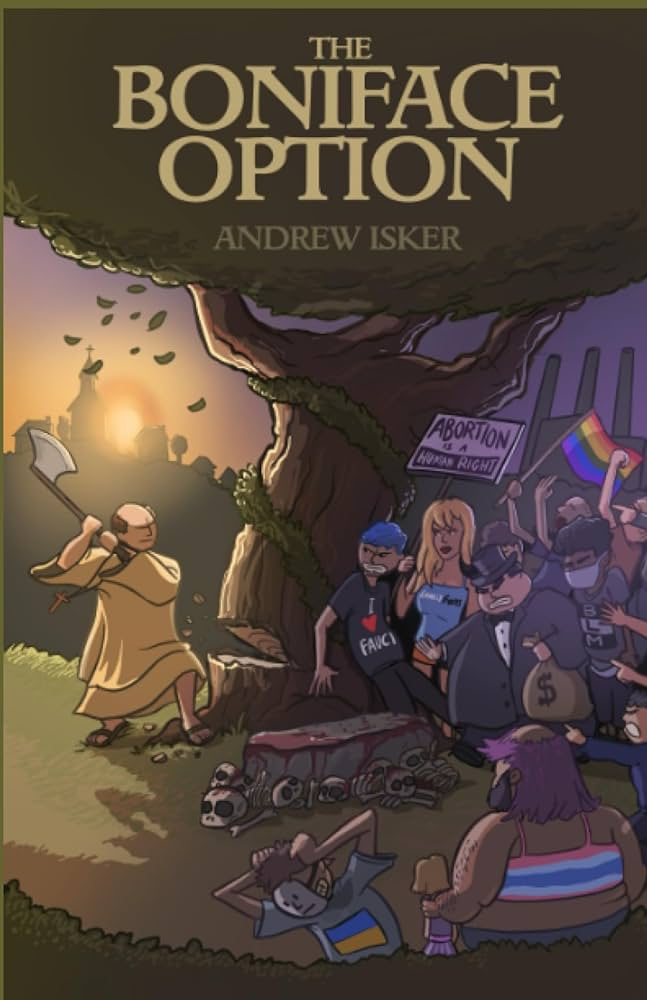
Andrew Isker’s The Boniface Option is a blistering 160-page diatribe against “Trashworld” (p. xi, 8, 28, 29, 30, etc.) and its “fake and gay” (p. xi, xii, 29, 31, etc.) inhabitants, the “small-souled bugmen” (p. 14, 17, 18, 39, etc.) who want to indoctrinate you and your children into “globohomo” (p. 15, 18, 19, 68, etc.) The book’s title is a reference to Christian missionary St. Boniface, who chopped down Thor’s Oak in 8th-century Germany. His actions convinced the native inhabitants that their gods were powerless and led them to convert to Christianity. Taking Boniface’s defiance as a model, Isker eschews both “winsome” engagement and defeatist retreat and urges Christians to cast down the objects of our culture’s idolatry.
The goal of my review is two-fold.
First, I will explain Isker’s vision to “normies,” those of us who (according to Isker) hold beliefs that are still viewed as respectable within polite society. This step is crucial. Some normies will find Isker’s rhetoric so outlandish and distasteful that they will be tempted to ignore him. That would be a mistake. Growing numbers of young Christians are attracted to the Dissident Right, a group with which Isker shares significant ideological overlap. We should try to understand this appeal.
Second, I will critique Isker’s vision on biblical, practical, and ideological grounds. My hope is both that normies will see the underlying problems with Isker’s views and that disaffected Christians will think twice before accepting them uncritically.
Book Overview

One passage from the preface stands out as a remarkably helpful summary of the book as a whole. On p. xii-xiii, Isker writes:
Throughout the pages of this book, I use the term Trashworld to describe the dystopian society [in which we live]. And the point of The Boniface Option is to make you see it for what it is and to begin the hard work of escaping and overcoming it. Another phrase you will find in the pages of this book is fake and gay. What may seem like a transgressive, sophomoric internet pejorative has far more meaning than you may think. Trashworld is not inherently real. It is a massive, revolutionary superstructure made possible by the technological progress and the material abundance of industrial society… The gayness of ‘fake and gay’ is not merely some schoolyard slur. There is deep meaning to this, too… [the] homosexual is both the apex consumer and the easiest personality to manipulate and lord over… [The rulers of Trashworld] want you to be spiritually homosexual whether or not they can make you actually homosexual.
Isker’s views on other major topics in the book, including gender, education, consumerism, and health/fitness are elaborated in the following representative quotes:
There is a direct line from the first wave feminists introducing women into the proxy war of democratic politics [i.e. voting] to the most destructive perversions of Trashworld in Current Year. (p. 65)
“Until we are willing to admit that feminism, even (especially!) the feminism accepted by conservatives, is a demon goddess responsible for our enslavement, we will remain under the shade of the oaken shrines of Trash-world.” (p.68)
“Even their best and brightest [in Trashworld] are very stupid people. A plumber who has read The Iliad or City of God is better educated than most of the PhDs now living.” (p.76)
“[Marriage] is often an instrument of greater consumption for consumption’s sake. Even children are treated as consumer goods, a mere lifestyle choice, rather than the very purpose that God created marriage for.” (p. 92-93)
“The Barbell as the Key Out of Trashworld
[Those who rule over you] want you to have low testosterone… to be an immobile slug plugged into a virtual reality of endless entertainment and porn attached to a feeding tube filling you with a smoothie of canola oil and cockroaches.” (p.124)
“the public school is the incubator of the bugman. It is the paideia of globohomo…children are having puberty disrupted or even their genitals removed without their parents’ knowledge or consent.” (p.142)
We should draw several conclusions from these statements and similar ones that suffuse the work.
First, The Bonface Option should be understood as a piece of rhetoric, not a philosophical treatise. Yes, Isker argues that words like “Trashworld” or “bugmen” or “GAE” are not merely juvenile taunts. But, at the same time, they are juvenile taunts. They are meant to wake people up from their complacency so that they begin to loathe the perverse society they’ve come to think is normal.
Second, Isker’s book is radical. Not only “radical” meaning “extreme,” but also “radical” meaning “aimed at the root.” Isker does not want incremental change. He does not want to “dial back” the excesses of the Great Awokening. He does not want to prune the tree of postwar liberalism. He wants to cut it down.
Third, Isker’s book aims at action, not analysis. He attempts to provide an aggressive alternative to authors like Carl Trueman or Rod Dreher. Though he is not overly critical of them (and even praises them), he thinks that their prescriptions “simply will not be enough” to oppose “Trashworld, bugworld, globohomo, and this disgusting world of filth” that we find ourselves living in (p. 149, 147).
Finally, I have to add a crucial point for Boomers/Gen-Xers, Neocons, libertarians, classical liberals, and “principled pluralists”: Isker is not writing to you. If you read the passages I quoted with aversion rather than enthusiasm, then Isker is not writing to you. If you had to look up words like “bugmen” or “globohomo” on Urban Dictionary (or just texted your kids to ask what “Urban Dictionary” is), then Isker is not writing to you. If you “don’t know what time it is” (and don’t know what this phrase even means), then Isker is not writing to you. He is writing to fire up the troops for battle; he is not pleading with you to enlist.
Given this overview, I’d like to highlight some of the positive aspects of Isker’s book which evangelicals –especially evangelical opponents of Christian Nationalism– should take to heart.
Positives
Love and Hatred
First, Isker’s attitude towards sin is by far the best element of his book. He writes: “If the Christian has a passionate love for the truth of God’s Word, the goodness of God’s justice, and the beauty of holiness, he will necessarily have an intense hatred of the lies, injustice, and sin” (p.12). This is absolutely right. The Bible commands us, as Christians, to hate sin, not just at an intellectual level, but at a deep visceral level (Ps. 97:10, Prov. 8:13, Rom. 12:9, Jude 1:23, Rev. 2:6, etc.). Before we jump in with a thousand caveats and qualifications, we need to acknowledge that Isker’s statement here is correct and –what’s more– is a message that has been taught consistently by the church’s greatest theologians throughout history. If our religion is characterized solely by “niceness,” it is deeply deficient.
What husband, if he loves his wife, would stand by passively while his wife was mocked and beaten? And would it merely be enough for him, out of duty, to step in and protect her? Wouldn’t his emotional indifference be jarring and inappropriate? In the same way, if we truly love God we will hate what dishonors Him, and if we love other people, we will hate what destroys them.
Frog, Meet Kettle
Second, Isker’s specific applications of this principle should force us to take a hard look at the extent to which our moral intuitions have been shaped by 21st-century American culture. How would John Wesley or Martin Luther or Charles Spurgeon have reacted if he discovered that approximately one in five babies in the U.S. are intentionally killed in their mothers’ wombs, their bodies sucked out through a tube and tossed into a bag marked “medical waste”? What would they say to drag queen story hours or same-sex marriage or terabytes of porn being downloaded every minute or rampant consumerism? Forget for a moment how we react. How would they react? Isn’t it uncomfortably likely that they would express the same horror that Isker does, possibly to an even greater degree?
Trashworld Hegemony
Third, Isker is right to recognize that woke ideology has conquered nearly every institution in our society and that it is fundamentally incompatible with Christianity. Frankly, I can’t believe that we’re still debating this point, but if anyone is skeptical, please pick up my 500-page book Critical Dilemma. One dominant paradigm within our culture really does view Whites, males, heterosexuals, and Christians as oppressor groups and wants to fundamentally re-engineer society for the sake of diversity, equity, and inclusion. This is not a conspiracy theory; there are entire[1] textbooks[2] written[3] on[4] this[5] subject[6]. Isker’s excoriation of evangelicals who, in 2024, still have their heads in the sand is understandable.
The Serrated Edge
Fourth, Isker’s use of sarcasm and ridicule should not be summarily dismissed. Many evangelicals will hesitantly murmur that they agree with Isker: abortion, homosexuality, pornography, and materialism are wrong. But they still object to his tone. Yes, the Bible commands us to hate sin and to flee from it. But it also commands us to be peaceable and patient (Rom. 12:12, 1 Cor. 13:4, Col. 3:12, James 3:17). We follow a savior who is gentle and lowly, who didn’t come to slay his enemies but to die for them (Is. 53:5, Rom. 5:8, 2 Cor. 5:21, 1 Pet. 3:18). Do we really, then, think it appropriate to use language that will shame people and drive them away rather than inviting them to experience the grace and mercy we’ve received?
These are valid concerns, but Isker’s response would be two-fold: 1) the Bible sees the preaching of God’s wrath against sin as wholly compatible with the gospel. The OT prophets, John the Baptist, the apostles, and Jesus himself repeatedly warn people about God’s coming judgment. Their condemnations are scathing and they even mock their opponents at times. To say that this approach is impermissible is to pass judgment on the witness of the Bible itself. And 2) many evangelicals seem to have double standards when it comes to the permissibility of anger and righteous condemnation. We cringe at Isker’s hair-raising language about abortion or homosexuality. But then we turn around and call down fire on racism or anti-Semitism or sexual abuse? We rail against the “angry, anti-intellectual fundamentalists” and call them Pharisees. But when feminists get on social media to “shout their abortions” (i.e. publicly celebrate killing their own children), we bite our tongues and say that this is a complicated issue?
It’s worth asking ourselves: are we really committed to winsomeness? Or is our purported winsomeness merely a way for us to “punch right; coddle left”?
Consumerism Bad
Finally, Isker’s criticism of consumerism is a stance that puts him in agreement not only with the church throughout history (c.f. the dangers of Mammon), but also –ironically– with hippy-ish, anti-capitalist elements of our culture today. Human beings are not interchangeable economic widgets who exist merely to “consume product” (to use a memorable phrase that Isker presumably borrowed from either 4chan/pol or the now-banned ConsumeProduct subreddit).
Negatives
If Isker’s book has positives that its detractors may be tempted to overlook, it also has significant negatives that his fans may be tempted to overlook.
Hatred and Love
First, while it is true that love for good should generate a corresponding hatred of evil, the converse is absolutely not true: a hatred of evil does not necessarily generate a corresponding love for good. Various alt-right groups hate anti-White racism, but they also hate Jews. The notorious Westboro Baptist Church made news throughout the 2000s by condemning homosexuality while picketing military funerals waving “God loves dead soldiers” signs. Scripture itself furnishes numerous other examples. The Pharisees hated law-breakers, but they also hated Jesus. The Judaizers hated antinomianism, but they also hated the gospel. Online, you can find many communities dedicated to ridiculing and mocking “Trashworld” and “globohomo” that are nonetheless populated by Neo-pagans and Nietzscheans. Indeed, a great deal of Isker’s thinking mirrors that of figures like Bronze Age Pervert, a self-described pagan who coined the term “longhouse.”
I’ll return to my concerns about this alignment later, but we need to ask whether it’s healthy to feed ourselves on a homogeneous diet of revulsion and disdain. “Hate the sin; love the sinner” is a cliché in many Christian circles but it’s a cliché rooted in biblical principles (Matt. 5:43-48, Luke 6:27-36, Rom. 12:19-20). Yes, “loving your enemies” includes warning them about their sin. But “love” cannot and must not be limited to warning them about their sin. After all, the fruit of the Spirit is “love, joy, peace, patience, kindness, goodness, faithfulness, gentleness, and self control” (Gal. 5:22-23). The fruit of the spirit is not “loathing bugmen, mocking Trashworld, and calling things fake and gay.” Even pagans can do that; Jesus expects more of his followers (Luke 6:32-36).
Hyperbole and legitimacy

Second, I’ve already argued that Isker’s book frequently employs hyperbole. But does it? Or, more precisely, do Isker or his fans think he is actually using hyperbole? When Isker says that “they” want you to be simultaneously obese and malnourished, sucking down cockroach and canola oil smoothies all day, is he humorously exaggerating? Or is he making an allusion to “their” actual plans for the not-too-distant future? Based on social media responses, answers seem to vary.
And who are “they”? Are “they” impersonal market forces? Demonic powers and principalities? Government policy makers? The “coastal elites”? The World Economic Forum? Bill Gates and Anthony Fauci? The “Elders of Zion”? Again, I suspect that readers will offer a variety of answers consistent with their own personal ideologies.
More important, though, is the question of whether Isker’s hyperbole is wise and legitimate. Think about how hyperbole has functioned on the Left over the last few years: “Cops are gunning down innocent Black men by the thousands!!!!” “January 6th was the greatest attack on America since Pearl Harbor!!!!” “The U.S. is one step away from a full-blown theocracy!!!!” Do progressives recognize that these claims are not actually true? Or does the constant chanting of these mantras begin to warp their perceptions of reality? Should we not be concerned that something similar is happening on the Right?
Ancient Trashworld

Third, Isker repeatedly praises the wisdom of the classical world. Throughout his book, we get a sense that Trashworld is a modern invention, something that began around the time of first-wave feminism and/or the Industrial Revolution. But is this a biblical or a clear-eyed view of history?
When Isker commends Herodotus or Homer or Virgil or Thucydides to us and urges us to reclaim the riches of the Western tradition, is he considering what the actual Greco-Roman world looked like? The Romans were well-known for infanticide, abandoning female or sickly infants to die of exposure. Pagan religion included ritual prostitution, both male and female. Pederasty was openly practiced by emperors and philosophers. Young boys were castrated to serve as slaves for the rich. Modern archaeologists can identify ancient brothels by the heaps of infant skeletons found on their premises. So why does Isker have such a positive view of the works produced by ancient Trashworld and such a disdain for the works produced by our modern version?
Moreover, Scripture insists that “the world” is in rebellion against God (Rom. 12:2, 1 Cor. 4:4, 1 John 2:15, 1 John 5:19). Not “Trashworld,” not “the communist world,” not “the Third World,” not “the Greco-Roman world,” but the “world,” the totality of sinful humanity throughout history.
Of course, recognizing the sins of ancient cultures in no way excuses the sins of ours nor does it mean that all cultures are equally bad. But it does change our perspective. We are not aiming for a return to some idealized past nor are we fighting a new battle. Rather, we’re fighting the battle of the Church in every age of human history: lifting up the truth of the gospel in the midst of a dark and evil world.
Knives Out

Fourth, the second half of The Boniface Option lays out Isker’s plan for “Transforming the Felled Trees of Trashworld into a New Christendom” (p. 77). He contrasts his project to that of Christian writers like Peter Leithart or Rod Dreher or Carl Trueman or Aaron Renn who –in various ways– urge Christians to escape from a culture gone mad by establishing strong, local, ecclesiocentric Christian communities. However, Isker insists that this approach is “totally unworkable” (p. 147) because “Trashworld is everywhere” (p. 145-146) and “Trashworld is not going to allow you to retreat to the monastery” (p. 149, c.f. p. 8). Instead, Isker believes that conquest is our only workable strategy.
But what exactly does this strategy entail? Isker explains in Part 2 of the book: recovering traditional worship (p. 79-89), reestablishing male-led Christian households (p. 91-106), restoring male friendship (p. 107-116), exercising and eating healthy food (p. 117-126), restoring the honor of motherhood (p. 127-136), and sending your children to Christian schools (p 137-143).
To be honest, these suggestions puzzled me; Isker seems to be advising us to do exactly what Dreher, Leithart, Trueman, and Renn are advising us to do. But if Trashworld isn’t going to let you do these things inside some relatively insular Christian community (as Dreher et al recommend), why would it let you do exactly the same things in the middle of the town square while shouting “Death to Trashworld”? If “they” are so powerful that they control the global food supply, all three branches of government, both political parties, business, sports, education, health care, and entertainment, why won’t “they” just throw you in jail the second you become an actual threat to their hegemony?
This seems like an unresolvable contradiction.
Right-wing wokeness

Finally, several conservative evangelical commentators have noticed the emergence of a “woke right” with a belief structure that’s eerily similar to that of the “woke left.”
For example, in 2020, I succinctly defined wokeness as:
1) society is divided into oppressed/oppressor groups along lines of race, class, gender, sexuality, etc via 2) hegemonic power. But privileged people are blind so 3) we need to defer to the lived experience of the marginalized to 4) dismantle unjust systems.
We can define the “woke right” in precisely analogous terms:
1) society is divided into straight White men and their enemies via 2) hegemonic norms (“the Longhouse,” “postwar consensus,” “Judeo-Christianity”) but normies are blind so 3) we need to redpill them to 4) retake the West.
In this review, I don’t have the space to fully unpack these beliefs. However, I will point out two problems that both the “woke left” and “woke right” share when it comes to Christianity.
First, both ideologies assume the blindness of their opponents in a way that makes disagreement difficult if not outright impossible. We recognize this game immediately when the woke left plays it: “do you agree that the United States is a white supremacist nation steeped in systemic racism? If not, that’s only because you’re blinded by your privilege. You’re just trying to protect your power. You’re just defending the status quo.“
Unfortunately, I’ve seen similar kafkatraps from the “woke right”: “do you agree that racism is a made-up, Marxist sin? If not, that’s only because you’re blinded by the postwar consensus. You’re just trying to suck up to elite sensibilities. You’re just defending the status quo.”
Adopting this kind of cynicism towards others’ motivations makes dialogue impossible and will even shut the door to Scriptural correction. “That’s just your straight White male interpretation” easily turns into “That’s just your gay, longhoused, Boomer interpretation.“
Second, both ideologies will necessitate troubling alliances. Those of us who have spent years fighting wokeness in the church can remember how “social-justice-minded” evangelicals reacted to our warnings. When we saw them adopting language like “white privilege” or citing the work of critical theorists or locking arms with theological liberals, we were often rebuffed. They insisted that we were being alarmist. Rather than drawing clear lines between themselves and the secular left, they circled the wagons. That didn’t end well for them.
In the same way, there are undeniably racist, misogynistic, and anti-Semitic elements on the “woke right.” But because they’re expressing the same disdain for Trashworld, Christians are tempted to tolerate them. The reasoning goes something like this: “#BigEva leaders who question our alliances just don’t know what time it is. They’re being alarmist. Sure, we may disagree with some of the stuff that our frens say, but evangelical Boomers are just desperately seeking respectability from the coastal elites. So no, we’re not going to performatively denounce ‘racism’ or ‘anti-Semitism’ or whatever bogeyman their postwar liberal fever-dream has invented. No enemies to the right!“
For what it’s worth, I don’t think the assumptions of the “woke right” necessitate the kind of wholesale apostasy that the “woke left” demands. But perhaps we should remember Paul’s admonition to the Corinthians: “Do not be misled: ‘Bad company corrupts good character'” (1 Cor. 15:33). “What you tolerate you will eventually celebrate” is a dictum that both the left and the right should keep in mind.
Conclusions
Pastor Doug Wilson, who endorsed Isker’s first book Christian Nationalism, nonetheless recently expressed his concern over the “woke right” in an interview with Pastor Sean Demars and Joe Rigney:
Demars: Do you believe in the “woke right”?
Rigney: Like basically the equivalent of the woke left but the Dissident Right guys…
Wilson: This is something I’m actually quite concerned about [–] identity politics on the right…these are people who’ve been taunted their entire adult lives for being White. And finally they say “I might as well be proud of it…I’m going to be White and proud and start hating Jews.” That is a big concern of mine… On the anti-Semitism which is starting to manifest itself on the Right: I’ve been fighting that tooth and nail. And a lot of people on the Right have responded with ‘Ok Boomer’
Given that Wilson is one of the only prominent evangelical theologians sympathetic to Christian Nationalism, his warnings ought to be taken seriously.
Speaking personally, I understand the frustration of young White men who’ve spent the last decade watching evangelical leaders sit back or, even worse, pile on while they were being collectively reviled. But the solution to reviling isn’t more reviling. My consistent message has always been: we don’t have to choose between embracing CRT and embracing racism; we can reject both.
However, in my mind, an even greater danger of rightwing wokeness is the ever-simmering resentment at its heart (yet another way that it resembles leftwing wokeness!). As I mentioned above, there is a biblical case to be made for mocking sin. But it is far, far harder to mount a biblical case for mocking genuine brothers and sisters in Christ. A constant theme of the New Testament is that Christians are to be united in love towards one another (John 15:35, John 17:20-23, 1 Cor. 1:10, Phil. 2:2, 1 Pet. 3:8). These repeated commands are wholly incompatible with the posture of constant ridicule and scorn towards other believers that is so prevalent on social media. I find it horrifying that I routinely encounter professing Christians with Boniface axe emojis in their Twitter bios telling me things like “go back to India” and “you were born in a trash heap” (I’m from Delaware, guys). Brothers, such things should not be. If you’ve excused your own bad behavior or the behavior of your allies because you believe that your political goals are righteous, then you need to repent.
As for Isker’s book, it provides a useful window into the Dissident Christian Right, but is unlikely to persuade anyone who isn’t already a true believer. As a strategy for re-conquering the West for Christianity, it offers little that hasn’t already been discussed by other authors. Its vision is truncated, rightly articulating a biblical hatred of sin but failing to display an equally biblical love for sinners.
To those who direct their Two Minutes Hate towards Trashworld every time they turn on their phones, my final plea would be this: examine your spiritual fruit. Since taking the red pill, have you grown in joy or in anger? Have you grown in love or in enmity? Have you grown in gentleness or in divisiveness? Are your words edifying or bitter? Pure or unwholesome? Then consult Gal. 5: 19-24 and Eph. 4:29-32. Everyone is on a trajectory. Make sure that yours is towards Christ.
Related articles: